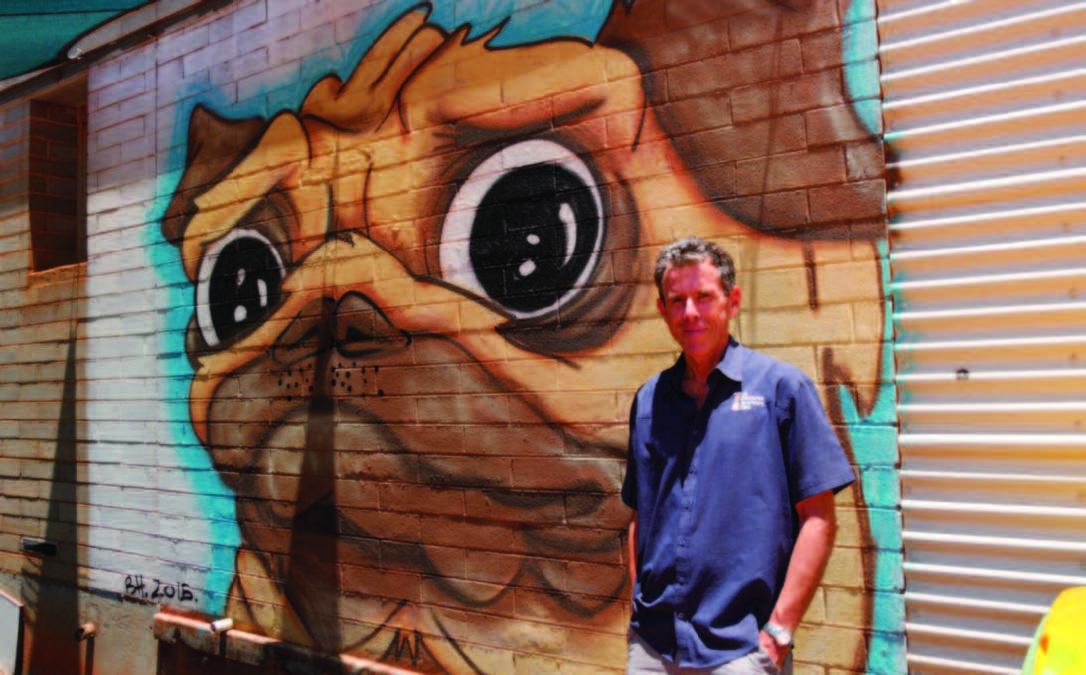2018 - A TYPICAL BROOME STORY
How did you end up in Broome?
“Like lots of young vets, I did locums in the UK and then had a great time spending the money I’d earnt in Europe. After a couple of years overseas I returned to Melbourne but wasn’t that settled, so I got a job as a tour guide with World Expeditions and worked in Alice Springs in the MacDonald ranges, then Darwin, doing trips to Kakadu. After finishing the tour guiding, I backpacked to Broome arriving with no money. I thought it was about time I went back to being a vet. I caught up with Dave Morrell, the local veterinarian to see if he had some work and though he had nothing at the time he asked where I was staying.”
“I was staying at the Last Resort for a few days, then decided to do a 2-week Kimberley trip with a couple of friends. When I returned, I had arranged to return to Melbourne for my father’s 60th, so I was flying out on the Saturday and had no plans to return to Broome. That morning Dave Morell – the local vet wandered into the Last Resort where I was staying. The first thing he said was can you get me a coffee, and the second was do you want a job. He’d had an argument with one of his vets the previous night – so there was a job available if I wanted. Dave flew me back from Melbourne and I did a two-month locum at the Broome Veterinary Clinic. That turned into 2 1/2 years.”
Why did you choose to be a vet?
“I am a tinkerer. I like fixing things and that is the part of my job that I love the most the surgery. I was always fascinated by anatomy and do have a very ordered factual mind, so my profession fit. When an animal comes in with a broken leg, you are putting something back together that is going to work – you see a result and that is such a rewarding part. My everyday job is giving vaccinations, injections, tablets and instructing the is a good dog owners not to overfeed their dogs. People do come in expecting something exotic thing to be wrong with their dog but as I was taught always look for the common thing first and that is usually the problem.”
Tell me about your practice.
“I felt there was room for another veterinary practice so in June 1998 I opened All Creatures Veterinary Clinic. The next couple of years were busy as I was starting a business, getting married, starting a family and we built a house. In that short time, we had invested in a life in Broome. If Dave had arrived one day later at the Last Resort the story would have been different.
When I first opened, I was working with some horses and camels, but as a lot of vets do, you need to become specialised and be good at a few things rather than okay at many. Now I am a small animal veterinarian.”
What animals do you have at home?
“At home, I have a boxer “Lilly” and a little Broome special “Bruce”, “Oscar” the cat and chooks and fish. Over the years I have also had ridgebacks and cross breeds - we have always been a two-dog family. You really learn a lot from having your own dogs.”
Do vets watch vet programs?
“You might think they do but I very much doubt it. If I was going to watch one, it would be the vet in the UK that does that incredible orthopaedic surgery. That surgery is very expensive and most pets in the UK are insured, unfortunately not many people insure their animals here. I believe people should ensure their pets and it would of course help us a lot when it does come down to the question of surgery and the life-or-death question.
I did write a column for The Broome Advertiser for many years about all subjects on animals, hoping to educate people on different problems. I now have a segment with Vanessa Mills on ABC radio and have great discussions on a broad spectrum of subjects – I find that stimulating and fun.”
How to you keep up with new skills in your profession?
“I go to the national conference for a week every 3 years. On a yearly basis, there is usually a weekend conference, this year I went to the Northern Territory branch of the Australian Veterinary Association annual conference. Broome is quite isolated, so it is important to go to these conferences.”
What are your passions?
“I love cycling, I just went to the Tour of Margaret River with a team of 6 riders from Broome. Broome as you know is pretty flat for miles and the weather can get a bit hot sometimes to sustain your energy levels. I also love my yoga, photography, camping and just really living a healthy lifestyle. Broome and the Kimberley has been a great place for me, a vibrant community and it has been a wonderful time and place to have a family.”
So, what is your dream for the future?
“I suppose mine is a typical Broome story. A huge part of our lives has been woven in Broome. Now we are looking at the future for our kids. We will eventually move to Melbourne, and I really don’t have a concrete plan. I like what Tim Minchin says – “You don’t have to have a dream”. So, no big dream, just excited about the future.”
Here is an article on Snakebite that John wrote for The Broome Advertiser. He has a whole book of them. Maybe one day he will write a book!
Snakebite in dogs and cats can occur all year in a climate such as Broome’s but is more common in the wet season. The two types of venomous snakes found in this area are the ‘Gwarda’ or Western Brown Snake and the King Brown Snake or ‘Mulga Snake’. The King Brown is actually a member of the Black Snake family. Dog breeds such Jack Russell and Fox Terriers are especially prone to snakebite because of their bold and inquisitive nature.
Snakebite symptoms include respiratory difficulty, convulsions, diarrhoea, vomiting and collapse due to muscular paralysis. Severity of symptoms depends on the type of snake, amount of venom injected and location of the bite. Animals bitten on the nose or tongue will absorb the toxin very quickly and unfortunately will often die before treatment is started. A bite low on a limb with only a small volume of venom may take hours before symptoms are noticed. There is usually no evidence of the location of the bite.
If you suspect snakebite contact the clinic immediately so we can make an assessment and administer antivenom if necessary. There are many ‘false alarms’ for snakebite, and antivenom is very expensive, so we often do a Snake Venom Detection Test on blood or urine to determine if a bite has occurred. This test also identifies the type of snake so the appropriate antivenom can be administered. We also give intravenous fluids and hospitalise the patient during recovery. Early treatment of snakebite is usually successful. Some owners report that it takes months after snakebite for their dog to return completely to normal.
Tia’s tip for the week: “Puppies need to be wormed every 2 weeks starting at 4 weeks of age. Vaccination starts at 6-8 weeks of age.

